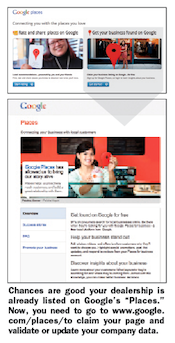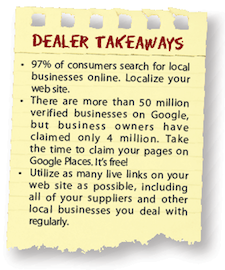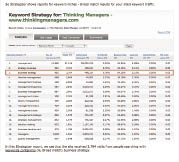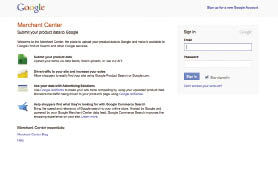With few exceptions, the customer base of most equipment dealerships serving the rural lifestyle market is local. Because they need the service that dealerships can offer or they want to establish a relationship with their equipment supplier, most customers prefer to stick with businesses that they know and that are convenient.
At the same time, it's been demonstrated that rural lifestyle customers do a lot of research before even stepping foot in a dealership. In fact, according to the search engine, Google, 97% of consumers search for local businesses online.
As was reported in the Summer 2011 issue of Rural Lifestyle Dealer (see "Rural Lifestylers Influencers in the Digital World," p. XX), "Knowing that most of this research is happening online, dealers can get involved by providing relevant and searchable product information on their own web sites. If that doesn't happen, the business may not be looked at as a resource. Also, by including lots of information and encouraging reviews, the web site will rise to the forefront of search engine rankings (called Search Engine Optimization, or SEO)."
For these reasons and others, dealers need to focus on the "local" aspects of their web sites.
Claim Your Page
There are numerous ways for a dealership to improve its SEO rankings and prominence in web searches without spending a lot of time and money, says Ryan Dohrn, CEO and founder of Brain Swell Media, a media sales training and Internet strategy company. These include tweaking your web site in ways that get the attention of the various search engines, and making sure that information that shows up on your company on any number of web directories is correct and complete.
The first thing every dealer should do is to find out where their dealership is listed and, more importantly, if it's listed in at least the three major search engines. Each has a platform specifically aimed at local businesses. These include:
- Google Places
- Yahoo Local Business Center
- Bing Local Listing Center
Of these, Google is the most dominant search engine today. So, one of the best places to start is with Google Places for business. This is a free local platform designed specifically for local businesses. Google doesn't accept payment to include particular listings or sites in its search results. The search engine also requires that every business listing have a mailing address. And only businesses that make in-person contact with customers qualify for a Google Places listing.
The Google Places platform is linked to Google Maps, and its aim is to have a web page for every location listed on its web mapping application. When Internet browsers search for a business in their area, their search will show all applicable Google Places, as well as identifiers on the coinciding map.

|
According to Google, "Currently, there are over 50 million verified places on Google Maps, but only 4 million businesses have claimed their 'Places' page." By claiming your dealership's Google Places listing, you can customize your page, including hours of operation, product and service offerings, coupons, photos, videos, service areas and more, you can also provide real-time updates for your customers via Google's online Local Business Center.
The real trick, says Dohrn, is to take full advantage of this free service by utilizing some very basic ways to optimize your dealership's ranking through Google Places, as well as the other search engines.
Optimize Your Ranking
The first step is to set up an account with the search engine. In the case of Google, go to google.com/places. "It's pretty simple process and it's free," says Dohrn. Then find the listing for the dealership.
First and foremost, Dohrn says, make sure the dealership's profile is complete. "Google rewards you for giving them data, so they want your profile to be as complete as possible, including photos. Take pictures of the dealership and equipment sold, and place them up when you're building your Google Places profile. What you can't do is leave your profile 50% complete. That doesn't mean it won't show up, but the business probably won't show up early in the search," Dohrn says.
The next step is to make sure that the address that you're using is one that Google recognizes.
"This is really important in rural America," Dohrn explains. "All of us have different ways that mail reaches us. For example, I live in a rural area. If you send me something and show Rural Route #2 as my address, it will get to me because the postman knows where I live, but Google doesn't. If you were to punch in this address for my house in Google, it will show a house that's about a quarter mile down the road."
|
He says what the dealer needs to do is determine what address Google shows for his store. Is it a 911 address, a street address, a county road or a highway?
To find out, type the name of the dealership and see what address the search engine has for your business. This is typically the address that you'll need to use. "Remember," Dohrn says, "the 911 address that's provided by your county isn't necessarily the addresses that Google is recognizing.
"Make sure your address is correct. If it's not, then you'll want to report that to Google. It's not a huge ordeal to do so," Dohrn says. "As you're going through your listing, Places will ask if your address is correct. If it's not, click on it and it will allow you to send Google a note to correct it."
Links, Links, Links
The next step is to make sure all of the dealership's suppliers are listing your store on their respective web sites. "Don't assume that this is the case," says Dohrn. "Check it out."
In any case, you should contact all the manufacturers and suppliers that the dealership does business with and make sure the contact information they have for your business is correct on their web sites. Also, make sure there are "live links" to your web site.
"Live links are important," says Dohrn, "because in a lot of cases your suppliers may list your company name and phone number, and that's about it. So, if I was a dealer, I'd be asking everyone of my suppliers for links back to my dealership's web site."
Next, he suggests, check out local newspapers, clubs and associations that have any type of links directory and ask to exchange links with them. "It's one of the most common things overlooked by small business owners," Dohrn says.
He offers several examples. The dealership's local insurance representative should be linking to your web site and vice versa. The same holds true for your car and truck dealer, and even your local newspaper, radio station and barbershop, he says.

|
"Everybody should be linking back and forth. This is a way to create a very small, but powerful web presence among local businesses that have like-minded interests. Google loves links and it helps everybody out," Dohrn says.
Check Free Directories
In his recent white paper, "How to Win the Local Marketing Game," John Jantsch, a marketing consultant and author of "Duct Tape Marketing," points out that online directories continue to emerge that list local businesses and their contact information. These directories increasingly appear high up on the first page of a search. Many also list your business's name, address, phone number and site link in its search summary.
He suggests, "Your first step is to be sure you are listed in leading directories. The best way to find out which directories relate most closely to your field is to search for your business and those of your competitors. If your business's name does not appear in the directories that surface, review their home pages for instructions on how to set up a profile or provide a profile entry."
Jantsch adds that businesses should also check their information in the most popular address directories, "which are feeding grounds for larger directories and search sites." Some of the more popular address directories include infoUSA and Localeze as well as Internet Yellow Pages, SuperPages, Switchboard and YellowBook.
Two good sources of information for directories are GetListed.org and Universal Business Listing. The latter is a fee-based service that will place your business in numerous online directories and portals that are used by many applications and tools.
Just as you verified your business information in the major search engines, you should do the same to ensure that it's accurate and up to date. Also, click on all links associated with your business to ensure they are active and reach your site.
"There's something to be said about doing the checking on your own," says Dohrn. "You could hire somebody for a few hundred dollars and have them check your business information in these directories, and correct any errors they may find. It sounds simple but whoever does the checking must follow up with the directory contact and be able to respond to any questions they have to make sure it's thorough and correct."
Look for Big Red Flags
There's no doubt that many dealers can accomplish many of the suggestions made here on their own. But if you decide this sort of thing isn't really your cup of tea, there are plenty of people out there who can get it done for you. But Dohrn has some suggestions about things you need to look for when looking for someone to help improve your dealership's SEO and localizing your content.

|
The first red flag, he says, is anyone who promises they can get you to the number one spot on Google, especially someone who knows nothing about your business. "It would be like me taking my tractor to a car dealer. It makes no sense. You want to find someone that knows something about your business. I know about tractors, but I'm sure there's someone local who knows about farm equipment," Dohrn says. "If possible, try to find someone local."
Another big red flag is if they want all the money up front for this type of service. Instead, it should be a monthly fee, he says. "You should be able to get it done professionally for about $100 a month. Or, you can pay a one-time fee to have someone set it up and let it go. From a small business perspective, these are the main things that I would look out for."







Post a comment
Report Abusive Comment